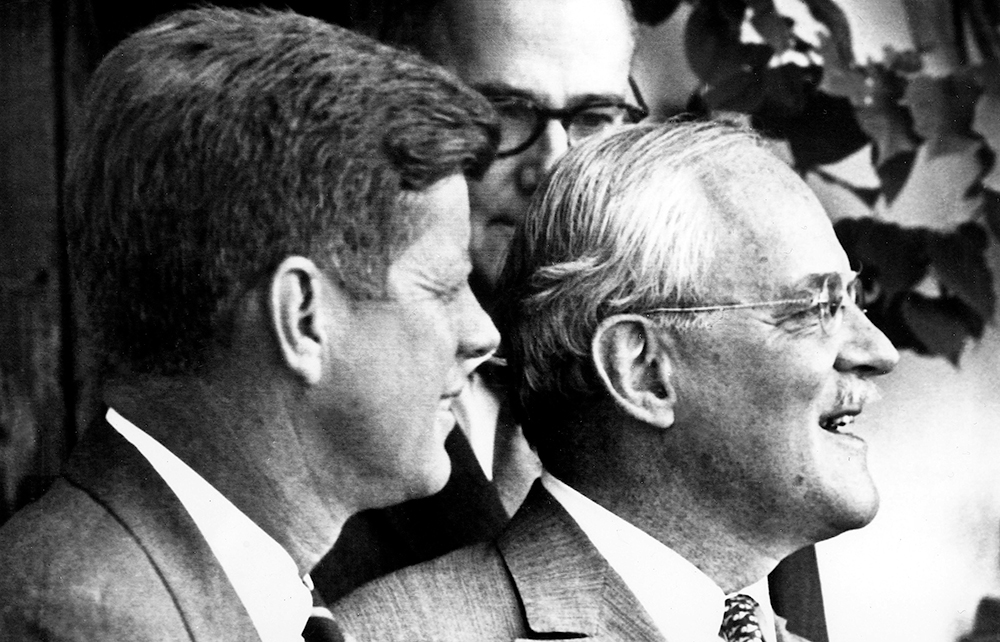The CIA, this fascinating new history notes, is ‘possibly the most infamous organisation on the planet’. Its hidden hand is often presumed to be everywhere, pulling the strings. That’s pretty impressive, given that it only has, by most estimates, around 20,000 employees. (The exact number is, naturally, classified.) At the same time, it’s routinely portrayed as comically inept – a bunch of ‘clowns’ and ‘a refuge for Ivy League intellectuals’, as Richard Nixon put it.
This has led to a dichotomy in CIA histories. On the one hand it is depicted as an all-powerful evil force, responsible for many of the world’s ills since its foundation in 1947. On the other, there are chortles about its blunders and pratfalls – madcap schemes which were not enacted, such as creating exploding cigars to kill Fidel Castro, or a porn film to discredit President Sukarno of Indonesia. Mercifully, Hugh Wilford is in neither camp, nor is he part of that band that tries to have it both ways. A Brit who was educated at Bristol and Exeter universities and taught at Sheffield before heading to California State University in 2006, he is for the most part admirably fair-minded and dispassionate.
Angleton never quite got over Philby’s betrayal – which probably led to his eventual descent into paranoia
His approach is a little like that of Dominic Sandbrook and Tom Holland’s podcast The Rest is History, on which Wilford has appeared – entertaining, fact-filled and providing thoughtful context, rather than talking points for the minds-made-up brigade. Wilford also offers a lively and original thesis – that the CIA is essentially a continuation of the tradition of European intelligence services, and that Cold War spying had much in common with the colonial era.
He treats the reader to a captivating cast of characters and makes telling connections. He starts with Rudyard Kipling and his great 1901 spy novel Kim, about an Anglo-Indian orphan called Kimball O’Hara. Kipling lived in the US for four years in the 1890s and married an American. ‘He bequeathed,’ Wilford argues, ‘the first generation of Agency officers a love of romantic overseas adventure, combined with a whiff of imperial paranoia.’ We learn that Allen Dulles, the CIA director from 1953 to 1961 (the longest ever tenure), was a Kipling devotee who had a copy of Kim on his bedside table when he died, aged 75, in 1969.
T.E. Lawrence became a real-life Kim and was worshipped by Agency officers, including William Colby, the director from 1973 to 1976, and Dewey Clarridge, a swashbuckling case officer who led the CIA’s Latin America Division in the 1980s and became embroiled in the Iran-Contra affair. Dulles had met Lawrence at the Paris Peace Conference in 1919.
Both Harold ‘Kim’ Philby, the MI6 officer and Soviet traitor, and Kermit ‘Kim’ Roosevelt Jnr, an Arabist who played a key role in the CIA-fomented 1953 coup in Iran, took their nicknames from Kipling’s book. Roosevelt was a grandson of President Teddy Roosevelt, whose Roosevelt cousins Archibald and Cornelius also became senior CIA officers. Philby was a drinking pal of James Jesus Angleton, the Malvern-educated CIA head of counter-intelligence – the Agency’s chief mole hunter – from 1954 to 1975. Angleton never quite got over Philby’s betrayal – which probably led to his eventual descent into paranoia.
For all the anti-imperial instincts of many early CIA officers – a large number of whom had fought alongside resistance groups while in the Office of Strategic Services (OSS) in the second world war – they often ended up working with the British and other colonial intelligence services to suppress nationalist movements.
Wilford writes engagingly, with a telling eye for colourful detail. There are affecting scenes, such as ‘Kim’ Roosevelt meeting a stroke-stricken Winston Churchill, who confessed he would have loved to have taken part in the Iran coup. But the book is most valuable as a corrective to the knee-jerk criticism of the CIA that can descend into sneering anti-Americanism. For instance, Wilford gives the much-maligned Angleton his due for preventing Soviet penetration of the CIA when the British were betrayed by the Cambridge Five and others. And he is judicious in identifying presidential and policy failures, rather than laying everything at the door of the CIA. President Kennedy’s reluctance to provide air cover is identified as a primary cause of the failure of the Bay of Pigs operation in 1961. Conspiracy theories about the CIA are given short shrift, with The Onion getting the last word on JFK’s assassination:
Kennedy slain by CIA, Mafia, Castro, LBJ, Teamsters, Freemasons: President shot 129 times from 43 different angles.
While some have painted the CIA as cravenly beholden to US corporations, Wilford quotes a member of President Jacobo Árbenz’s ill-fated cabinet in Guatemala rejecting the notion that it was all about the interests of the United Fruit Company: ‘They would have overthrown us even if we had grown no bananas.’
In some respects, Wilford suggests, the early CIA was a victim of its own success. It got many things right. Its impressive victories in Iran, Guatemala and Afghanistan meant that it was able to ‘accomplish important US strategic goals at a fraction of the financial, reputational and human costs of conventional military warfare’. But this meant that it ‘suffered from the unrealistic expectations of successive Cold War presidents, who were angry when operations went wrong – but not so angry that they stopped wanting more’.
Readers should be aware that this is not a comprehensive history. There is little about paramilitary or technical operations. While 24 directors are listed at the front of the book, only 13 of them appear in the text. Wilford tilts heavily towards the period before 1980 and important directors such as George H.W. Bush, Robert Gates, George Tenet and Michael Hayden are not mentioned at all.
He is less surefooted on modern times, and the epilogue, in which he takes to task Gina Haspel, Donald Trump’s second CIA director, is skimpy and unconvincing. Surprisingly, and despite a wealth of documentary sources cited, there is not a single reference to the author having interviewed a serving or former officer. But such quibbles aside, the book is an absorbing read that adds much to our understanding of the CIA.







Comments